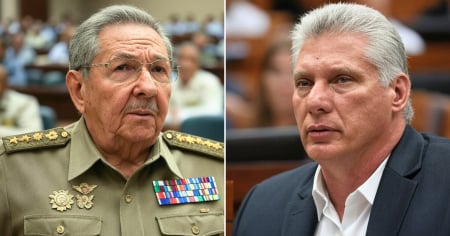Cuba's Prime Minister, Manuel Marrero, defended the recent changes to the regulations governing micro, small, and medium enterprises (mipymes) on the island, arguing that the goal is not to prohibit but to reorganize wholesale and retail trade in the non-state sector.
In his statements before the National Assembly of the People's Power, which concludes its extraordinary session today, Marrero explained that some of the business structures initially approved for specific purposes began to divert their activities, focusing on the wholesale import and sale of containers on the streets, a more lucrative business than what was initially promised.
"Many non-state structures were approved under the promise of developing beneficial activities for the country, but they discovered that selling containers on the street was more profitable than what was agreed upon," Marrero remarked.
According to the Prime Minister, this deviation created a "distortion" of the original objectives, leading the government to take steps to reorganize and regulate these types of practices.
It was clarified that self-employed workers who hold a license for wholesale trade will be able to continue doing so, as long as this activity is approved within their social purpose. However, those who do not have this authorization will have to comply with the new regulations and will not be able to engage in wholesale commerce.
Marrero also emphasized that the government's policies are not aimed at hindering private business activity, but rather at ensuring that small and medium enterprises (mipymes) contribute to the country's economic development within the established framework. He reiterated that the Cuban government has approved over 11,000 mipymes, which reflects its support for this sector, albeit within the confines of centralized planning.
These statements come in light of the recent resolution by the Cuban regime, published in the Official Gazette, which automatically cancels the wholesale trade licenses of many small and medium-sized enterprises that had been approved for this as a secondary activity.
According to the regulations, these companies will now have to form partnerships with state entities to continue operating in this field. The measure, as outlined by the regime, aims to "organize" wholesale trade and compel the integration of the private sector with the state sector, a trend that signals a move towards greater regulation of the Cuban economy.
The decision has raised concerns among private entrepreneurs, as it requires micro, small, and medium enterprises (mipymes) to quickly adapt to new conditions if they wish to continue their wholesale activities. The new regulations also set deadlines for updating business licenses and impose penalties for those who do not comply with the new requirements.
Frequently Asked Questions about the New Restrictions on MIPYMES in Cuba
What justification does the Cuban government provide for the new regulations regarding small and medium-sized enterprises?
Prime Minister Manuel Marrero stated that the aim of the new regulations is not to prohibit trade, but to reorganize wholesale and retail commerce in the non-state sector. According to Marrero, some small and medium-sized enterprises have diverted their activities towards the importation and wholesale sale of containers, resulting in a "distortion" of their original objectives and the necessity to reorganize the regulations.
How do the new regulations affect micro, small, and medium enterprises (MSMEs) in Cuba?
The new regulations automatically revoke the wholesale trade licenses for those small and medium-sized enterprises (mipymes) that had this activity as a secondary one. Mipymes that wish to continue wholesale trading must partner with state entities and update their licenses within a 90-day period. Those that do not choose to form alliances will have to liquidate their stocks within 120 days by selling them at retail.
What consequences could this measure have for the Cuban economy?
According to economist Pedro Monreal, the measure could stifle private commerce and increase inflation, as it turns small and medium-sized enterprises into captive customers of inefficient state-owned wholesale companies. This could exacerbate the chronic shortages on the island and lead to social instability, especially during times of high demand for consumer goods.
What is the Cuban government aiming for with these restrictions on small and medium-sized enterprises?
The Cuban government seeks to centralize wholesale trade in the hands of state entities, under the premise of improving infrastructure and transportation. However, critics argue that this increases bureaucracy and inefficiency, harming small and medium-sized enterprises (mipymes) and limiting flexibility and liquidity in the private sector.
Filed under:
